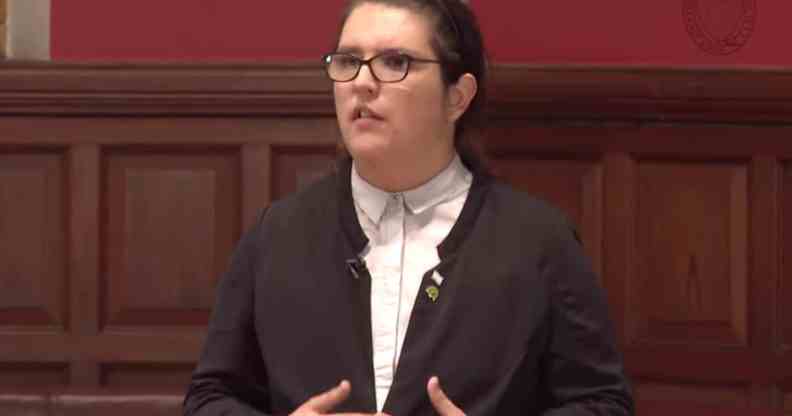
Aimee Knight, a former politician and transgender activist, is a name that sparks intense reactions. Once heralded as a trailblazer in LGBTQ+ advocacy and a rising star in British politics, her career has instead been overshadowed by missteps, controversies, and public outcry.
From political positions to employment debacles, Knight’s journey has been a whirlwind of ambition, scandal, and unfortunate decision-making.
The Early Days of a Promising Advocate
Aimee Knight’s introduction to activism was anything but understated.
Diagnosed with autism at age four and identifying as a girl from the age of 10, Knight faced challenges that shaped her outspoken nature. Her first bold act of defiance came during her high school graduation prom in 2014, where she publicly came out as transgender.
Despite initial resistance from her headmaster, who deemed her wearing a dress “unnecessarily attention-seeking,” Knight managed to make her stand. It was a defining moment that foreshadowed her determination to challenge societal norms.
Knight’s activism blossomed during her time at Henley College Coventry, where she served as the National Union of Students LGBTQ officer.
Among her early victories was a campaign against the college’s internet censorship of LGBTQ+ resources, such as Birmingham Pride’s website.
Knight labeled this censorship as “systematic discrimination” and successfully pressured the institution to remove the restrictions.
She quickly climbed the ranks of LGBTQ+ advocacy, joining Stonewall’s Trans Advisory Group in 2015 and organizing Coventry Pride in 2016 and 2017. Her influence extended to campaigns for gender-neutral language in public services, successfully pressuring Transport for London (TfL) to move away from phrases like “ladies and gentlemen” in their announcements.
Knight’s ability to get results was undeniable, earning her a reputation as a formidable activist.
Her efforts to reform the Gender Recognition Act of 2004 were equally ambitious. Knight argued for easier processes for transgender and non-binary minors to have their gender legally recognized, comparing the challenges faced by trans individuals to the oppression of gay people under Section 28.
For a time, Knight seemed unstoppable, a beacon of progress in an often-hostile environment.
From Promising Start to Spectacular Missteps
In 2014, Knight joined the Green Party, quickly rising to become its equality spokesperson and the chair of LGBTIQA+ Greens. She stood for elections at both local and national levels, representing the party’s commitment to diversity and inclusion.
By 2017, she had co-founded the Global Greens LGBT+ Network, connecting activists from across the world in the fight for LGBTQ+ rights.
Her political career, however, would soon unravel in a series of self-inflicted disasters.
The most damning scandal emerged in 2018 when her father, David Challenor, was convicted of raping and torturing a 10-year-old girl.
While the crimes were horrifying enough, Knight’s role in the situation added fuel to the fire. Despite knowing her father had been charged, she appointed him as her election agent for both the 2017 general election and the 2018 council elections.
This decision prompted an investigation by the Green Party into potential safeguarding failures.
Suspended on a no-fault basis, Knight maintained she had no knowledge of the full extent of her father’s charges. However, the inquiry found she had made a “serious error of judgment” and criticized party officials for failing to act on her disclosures.
The fallout was swift.
Knight resigned from the party in September 2018, citing transphobia within the organization, though skeptics noted the timing conveniently aligned with the ongoing investigation.
Undeterred, Knight joined the Liberal Democrats later that year, where she briefly served as the Diversity Officer for Coventry. But her political comeback was short-lived.
In 2019, her fiancé’s Twitter account began posting deeply disturbing messages about inappropriate fantasies involving children.
Knight claimed the account had been hacked, a defense that did little to quell public outrage.
The Liberal Democrats suspended her, and by December, Knight announced she was leaving politics altogether, citing the relentless abuse and harassment she had endured.
From Administrator to Lightning Rod for Controversy
As if her political career hadn’t already provided enough drama, Knight transitioned into the tech world, taking on a role at Reddit as an administrator. Initially, her work seemed relatively uneventful, but that peace didn’t last.
In March 2021, Reddit found itself at the center of controversy when a moderator for the r/ukpolitics subreddit was banned for sharing a Spectator article that mentioned Knight.
This sparked widespread outrage among Reddit’s user base, with over 200 subreddits going private in protest. Moderators accused Reddit of failing to properly vet Knight during her hiring process, pointing to her previous scandals involving her father and fiancé.
Reddit’s response only poured fuel on the fire.
CEO Steve Huffman issued a statement attributing the ban to an “overzealous” automated moderation system designed to prevent doxxing.
He admitted that Knight had been inadequately vetted before her employment and confirmed she was no longer with the company. The admission did little to appease critics, who viewed the entire incident as a failure of corporate accountability.
During the uproar, Knight faced relentless transphobic abuse online.
Anti-trans activists seized the opportunity to smear the transgender community, with prominent figures like Graham Linehan publicizing her deadname and using derogatory language.
Knight became a scapegoat, with her story twisted into a false narrative linking transgender rights to child abuse.
Resilience Amid Relentless Scrutiny
Knight’s personal life has been as scrutinized as her professional one. Married to Nathaniel Knight, she moved to the United States following her suspension from the Liberal Democrats.
Despite stepping back from public life, she continues to face harassment online, a grim testament to the toxic discourse surrounding transgender issues.
Her struggles with societal acceptance began early. When she came out as transgender, even her extended family questioned her identity, attributing it to her autism.
The NHS reportedly required her autism diagnosis to be re-confirmed before referring her to a gender services clinic, a delay she described as dehumanizing.
Knight has been vocal about the intersection of her autism and transgender identity, advocating for better support systems for individuals who share these experiences.
Yet, her advocacy has often been overshadowed by the controversies that have come to define her public persona.
A Case Study in Complicated Advocacy
Aimee Knight’s story is a tangled web of ambition, activism, and missteps. Her early years as a trailblazing advocate for LGBTQ+ rights showcased her ability to enact meaningful change, from holding institutions accountable to amplifying marginalized voices.
But her career’s trajectory serves as a cautionary tale about the consequences of poor judgment and the unforgiving nature of public life.
While her supporters argue that she has been unfairly targeted and harassed, her critics point to her repeated lapses in judgment as evidence of her unsuitability for leadership roles.
Regardless of where one stands, Knight’s story is undeniably complex, reflecting both the challenges of being a transgender activist in a hostile environment and the pitfalls of navigating public life without sufficient support.
Today, Knight remains a polarizing figure. Her name evokes admiration from some, outrage from others, and a sense of unease about the lingering societal divides surrounding gender identity and accountability.
If nothing else, her life is a testament to the messy, unpredictable nature of activism and politics in the 21st century.





